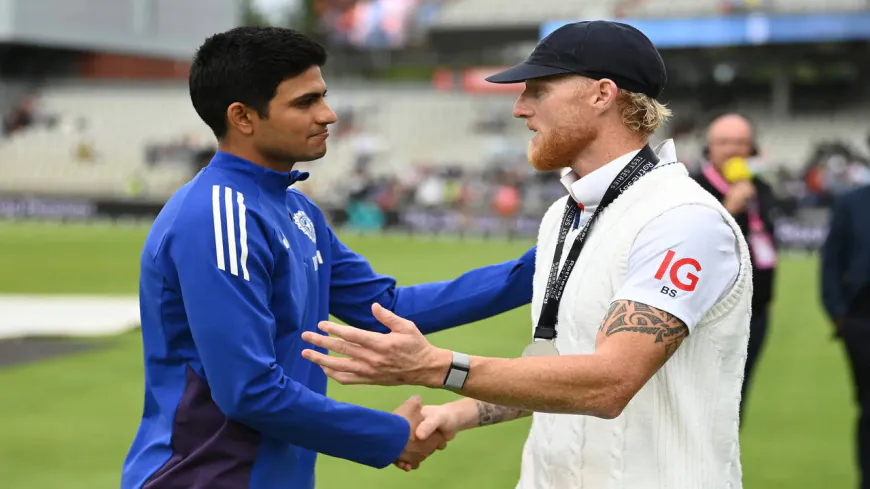Sunil Gavaskar Questions England's Strategy and Calls on Shubman Gill to Ask Ben Stokes
Sunil Gavaskar criticizes England's approach in the drawn Manchester Test and urges India captain Shubman Gill to question Ben Stokes over the late declaration. He praises India's resilience and highlights inconsistencies in England's strategy.

The just-concluded Manchester Test between England and India ended in a draw but it left more questions than answers behind. Although India demonstrated fantastic resilience in saving the match on the last day the manner in which the match ended raised massive debates all over the cricket world. One of the loudest voices to be heard was that of Indian cricketing great Sunil Gavaskar. He showed great pride in the Indian team for their comeback but also was critical of the English strategy particularly their decision-making towards the end of the game.
Gavaskar praised India for not surrendering despite the difficult weather and pressure of the situation. He was very proud of the team because they lost only four wickets on the last day regardless of how easy or flat the pitch was. In his opinion the Indian players were not bowled out under pressure and demonstrated character which needed to be appreciated. But the former Indian captain did not hesitate to question England's bizarre decision to keep on batting well beyond the 600-run mark. He likened it to an earlier Test match at Birmingham where India provided more than 600 runs for England to chase and were criticized by English players who accused them of being timid. Gavaskar noted that this time England played defensively and took a massive lead rather than putting the pressure on India.
According to Gavaskar, this attitude of England was just loud mouth and bluster without actual intention. He labeled it bravado and ridiculed the boisterous claims of some England players earlier about pursuing any score. He pointed out that when India actually provided them with such an opportunity they ended up being short of the target by more than 300 runs. This inconsistency in their strategy was something that Gavaskar wanted everyone to see. It struck him as unusual that England skipper Ben Stokes did not declare the innings despite having scored so much and wondered if the team had lost a genuine chance to try and get a victory.
What actually gave the entire scenario a lot of spice was Gavaskar's proposal for India's young skipper Shubman Gill. He asked Gill to ask Ben Stokes himself in the post-match press conference why England took a lead of 311 runs rather than opting for a low target of 240 or 250. Gavaskar made an observation that Stokes had already reached his century and still did not declare to provide his bowlers with more time to bowl out Indian batsmen. He felt that a few more overs would have been sufficient for England to win the match and didn't understand the rationale behind their choice to bat for such a long time.
Although Gavaskar knew that Gill is a humble and polite individual he stated that he still wanted people to raise such difficult questions. He jokingly called himself a different SG and opined that if he were Gill, he definitely would have confronted Stokes regarding the late declaration. This observation reflected how intensely Gavaskar was against the strategies followed by the English side and how much he felt India needed more explanation regarding the issue.
As the Test neared conclusion Ravindra Jadeja and Washington Sundar were closing in on their individual milestones with both pursuing centuries. It was at this point that Ben Stokes is said to have proposed a draw providing a handshake before the day was formally over. Stokes' action was later brought into disrepute and was interpreted by many including Gavaskar as an attempt to prevent more play when India still had aims in mind. Although Jadeja and Sundar went on to score their hundreds and the game resulted in a draw the move to stop the game prematurely set Indian fans and pundits to frustration and bewilderment.
The entire saga got more dramatic when there were comments from former cricketers such as Navjot Singh Sidhu and Geoffrey Boycott as well. Sidhu criticized Jadeja freely that he should take more responsibility in match-winning moments and Boycott provided his own analysis of the incident. But Gavaskar's reaction was most outstanding due to his candid and emotive commentary on the whole drama.
Gavaskar's annoyance appeared to be rooted in what he perceived as inconsistency between England's words and deeds. He reminded the public and players alike that this was the same group of players who had earlier talked of going after any target without fear but now insisted on creating an awfully big margin before presenting a draw. This contrast between word and deed was what he pinpointed and felt needed more attention.
In the end the Manchester Test might have ended without a winner but it certainly gave cricket lovers plenty to talk about. India’s fightback on Day 5 showed their determination and spirit while England’s cautious approach and eventual offer to draw the game left many puzzled. Gavaskar's words were not just the articulation of Indian fans but also highlighted crucial decisions of strategy that can turn the match around. As Shubman Gill develops as a leader he might recall this counsel from one of India's greatest cricket minds and learn how to ask the correct questions at the correct moment.



 admin
admin